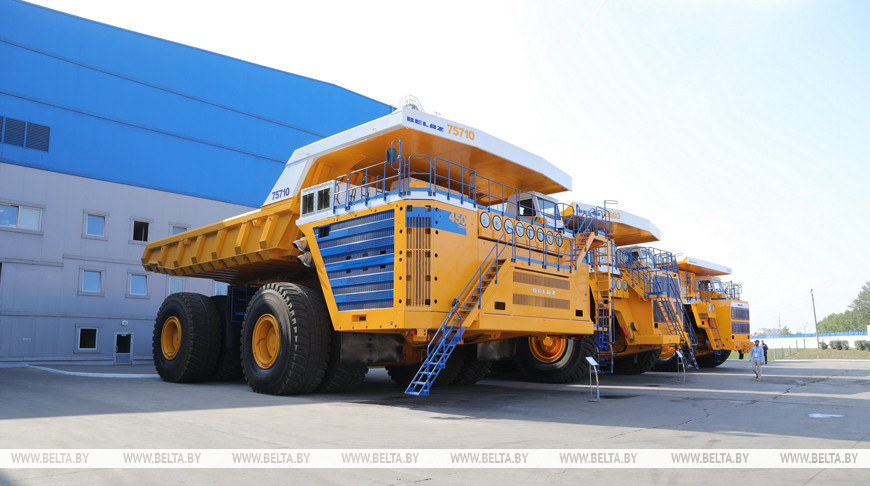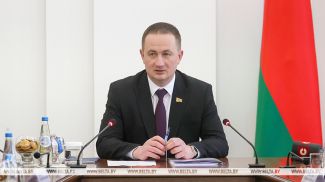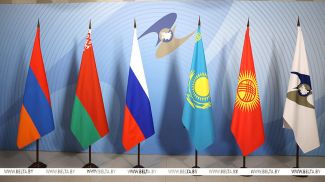
MINSK, 25 September (BelTA) - Director General of the Belarusian haul truck manufacturer BelAZ Sergei Lesin named import-substituting projects being implemented together with Russian partners as he spoke at a press conference on 25 September, BelTA has learned.
“Cooperation with Russia ensures more than 90% of BelAZ sales. Russian partners consider us as the main supplier of haul trucks,” Sergei Lesin said.
BelAZ uses the loan issued by the Russian Federation mainly to upgrade its own production facilities and increase the output. Once the project is implemented, the plant’s capacities are set to increase by 20%. The completion date is 2025.
“We have already upgraded more than 50 units of equipment. The total investment for this purpose exceeded $250 million. We have received the funds on favorable terms. By the end of 2025, we expect to get at least 70 units of equipment, which will let us not only increase production, but also improve the technical and economic performance of our products. This will also help us optimize the cost of production, which will have a positive impact on the prices we offer to our customers in the Russian Federation,” the director general said.
Speaking about joint import substitution, Sergei Lesin recalled a project with Magnitogorsk Iron and Steel Works and Severstal to substitute wear-resistant sheet steels. “Our partners are gradually increasing the volumes we need, and we cover what we lack with the help of friendly countries. Next year, I think we will completely cover all the volumes. Besides, there is a landmark project on the establishment of a joint venture in Pinsk, which has already launched the production of axial piston pumps. Earlier it was a product manufactured in Western European countries, but now it is a joint product with a Russian company,” he said.
Two projects are also underway with Russian manufacturers for such complex components as internal combustion engines. “The products are not the easiest to master, but we are moving forward. Prototypes are either assembled to be tested or already in operation. We are checking how it works and what adjustments need to be made to improve the reliability of the equipment. The first results are positive,” Sergei Lesin said. “The Russian market is our main market. It is not only a consumer market, but also a market of partners in technological cooperation.”
“Cooperation with Russia ensures more than 90% of BelAZ sales. Russian partners consider us as the main supplier of haul trucks,” Sergei Lesin said.
BelAZ uses the loan issued by the Russian Federation mainly to upgrade its own production facilities and increase the output. Once the project is implemented, the plant’s capacities are set to increase by 20%. The completion date is 2025.
“We have already upgraded more than 50 units of equipment. The total investment for this purpose exceeded $250 million. We have received the funds on favorable terms. By the end of 2025, we expect to get at least 70 units of equipment, which will let us not only increase production, but also improve the technical and economic performance of our products. This will also help us optimize the cost of production, which will have a positive impact on the prices we offer to our customers in the Russian Federation,” the director general said.
Speaking about joint import substitution, Sergei Lesin recalled a project with Magnitogorsk Iron and Steel Works and Severstal to substitute wear-resistant sheet steels. “Our partners are gradually increasing the volumes we need, and we cover what we lack with the help of friendly countries. Next year, I think we will completely cover all the volumes. Besides, there is a landmark project on the establishment of a joint venture in Pinsk, which has already launched the production of axial piston pumps. Earlier it was a product manufactured in Western European countries, but now it is a joint product with a Russian company,” he said.
Two projects are also underway with Russian manufacturers for such complex components as internal combustion engines. “The products are not the easiest to master, but we are moving forward. Prototypes are either assembled to be tested or already in operation. We are checking how it works and what adjustments need to be made to improve the reliability of the equipment. The first results are positive,” Sergei Lesin said. “The Russian market is our main market. It is not only a consumer market, but also a market of partners in technological cooperation.”













